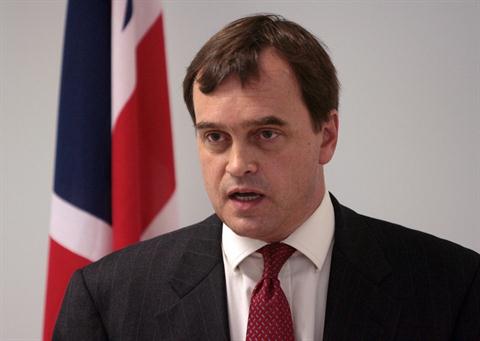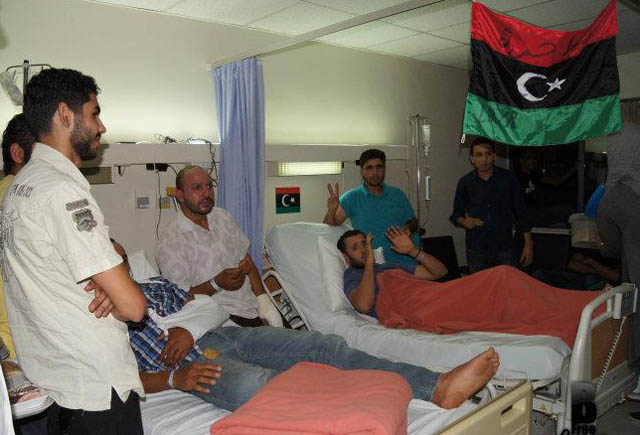By George Grant.
Tripoli, 23 June:

The British Ambassador to Libya, Sir Dominic Asquith, has spoken of the “fantastic” levels of support he . . .[restrict]has received from Libyans following the attack that took place on his convoy in Benghazi the Monday before last.
In reference to the assailants, the diplomat remarked that whilst it was “part of democracy” and “a good thing” that Libyans are now free to express their views and differences, “what they have to keep in mind is the manner in which they do so”. The attack resulted in the injury of two close protection officers travelling with the convoy, and could have cost the ambassador his life.
Sir Dominic made the remarks during a wide-ranging interview in which he provided his assessment of Libya’s prospects for democratic transition as well as new insights into the nature and objectives of British engagement in Libya. He also insisted that his embassy had resumed “business as normal” after the assault.
“We had the Queen’s diamond jubilee party two days afterwards [as scheduled]”, he said. “Lots of guests turned up from all corners of Libya. We had guests from Ghat to Tobruk, many of them there to make a point… The reaction from Libyans has been fantastic. We had so many letters, messages and telephone calls of support, from the very top down, and it’s been really touching how supportive they’ve been. It speaks volumes”.
Sir Dominic refused to speculate on who was responsible for the attacks, saying that the Libyan government was conducting an investigation and those interested in the case should await the outcome. He did say that the two injured men had been well treated at hospital in Benghazi and were now at home recovering with their families.
Asked if he believed this and other attacks on Western targets that have taken place in Benghazi in recent weeks to be part of a trend, the ambassador said he did not believe Benghazi should be separated out from the rest of Libya in this regard. “There are challenges the authorities have been facing from very early on in terms of differences of view that have existed since before the revolution that have existed between some of the communities in Libya” he said.
“There are views which people are now free to express, or agendas which people are freer to pursue, which is only natural; that’s part of democracy. We all recognise that, and to the extent that they are able to express those views and differences that’s a good thing. What they have to keep in mind is the manner in which they do so. Being part of a democracy means you do it peacefully, and not violently”.
Sir Dominic insisted that in spite of its present difficulties, Libya “can carry out a successful transformation from what it was to what it hopes to be: an open, stable, democratic and prosperous society”.
He also said it was important to set Libya’s transition to democracy into its broader context: “Those events that have been taking place since last year in some of these Arab countries are of a level of significance with what happened in Eastern Europe in the 1980s and 1990s and what is happening now with the global economic crisis. These are big historical shifts, and Arab Spring countries – as we call them – are leading the way in this change. Libya can lead the way.”
Next month’s elections represented “a hugely important next stage”, Sir Dominic said, in terms of providing Libya with an elected body and a government with the democratic mandate to lead. “The key issue for them will be to look at how to maintain that political momentum and seize the opportunity”, he added.
The diplomat also emphasised the significance of Libya’s democratic transition from a British strategic perspective, saying that “success here is as important for us, in a way, as it is for the Libyans”.
Explaining what the UK was consequently doing to support that transition, Sir Dominic outlined a number of key areas where his country was offering support. These include civil society development and women’s rights; preparing for elections and the drafting of the permanent constitution; economic development; education and vocational training; justice; and security and defence.
On the issue of civil society and women’s rights, Sir Dominic said the embassy was working closely with the British Council, helping to ensure that women in particular had their views reflected in the drafting of the permanent constitution, as well as helping them develop their influence at a local level in order to afford them a greater say in national politics later on.
He also pointed out that the UK is the largest donor to the UN election team, which has been working with the High National Elections Commission (HNEC) to prepare for the elections, as well as with the government in planning election security. Sir Dominic congratulated Libya on its preparations for next month’s ballot: “they’ve exceeded people’s expectations”, he said.
In addition to its financial support for elections, the UK is also the biggest donor to the UN’s mines advisory service, and Sir Dominic said that British teams had been working with the UN and Libya on mine clearance operations since the very end of the revolution.
Sir Dominic refused to confirm or deny whether or not the British government had been approached by Libya for the purchase of a number of Eurofighter Typhoons, as announced earlier this week by the air force chief of staff, Saqr Geroushi. “The Libyans are clearly looking at a variety of options across the security and defence spectrum, but I don’t think they are yet at the stage to make the big strategic decisions on purchasing… [but] any approach from the Libyans we will look at.”
Significantly, however, the ambassador did reveal that the UK is assisting Libya in strategic decision making, notably with regards to the nature, size and purpose of the Libyan armed forces, as well as the structural changes being made to the Libyan police.
The ambassador also took the opportunity to congratulate the International Centre for Prison Studies (ICPS) on the work it continued to do with the UK in improving conditions in Libyan prisons, remarking on the “extraordinary levels of trust” the organisation had managed to win with the judicial police.
One area where the British Embassy has been criticised has been its seemingly lacklustre approach to supporting UK businesses wanting to invest in Libya. Notably, there was not a single British company officially represented at the Libya Build trade fair in April, as compared to 134 from Italy, 42 from France, and 40 from tiny Malta.
Sir Dominic said, however, that the difference between the UK and its competitors was one of approach, not of effect. “When Prime Minister El-Kib was in London at the end of May, he was asked whether he thought we had been pushing British commercial interests hard enough, and his response was he didn’t think so because he hadn’t seen [many British companies]. My point to him was, ‘I don’t bring them in to see you prime minister’.
“We do not tend to bring in big ministerial teams with lots of businessmen coming in on the same aircraft for a couple of hours… The French bring in scores of people at once. We bring in relatively small teams by comparison, quite big for us, that are focused on particular sectors… What people see as the top line on activity – if calculated by the number of people trooping in to see the prime minister – seems to me to be a rather antiquated way of going about businesses. That’s the way it would have been done in Libya before, but I’m not sure it’s the modern Libya.”
The ambassador said, however, that no major contracts were being secured by any country prior to the elections, but that this would change once a new government is in place. “My expectation is that there will be a considerable upturn in activity in the last quarter of this year, but up to now it has been a positioning period, and we have been positioning ourselves strongly… I have seen no evidence that our competitors have done better”.
He added that a priority for any British company hoping to work and invest in Libya must be skills training and knowledge transfer to increase the capacity of the Libyan workforce.
One of the biggest challenges to securing foreign business interest in Libya, and to ensuring economic growth in Libya generally, will be fully disarming or absorbing the militia in the state security apparatus.
Sir Dominic said that Libya would need considerable time “to persuade some of those with weapons to give in those weapons, and it will also take time to persuade some of those who have weapons that there is a better future in conventional walks of life”. Nonetheless, the ambassador said he was “very confident that will happen so long as the authorities develop a vision of where Libya is going and a sense of national unity. That means proper attention to all the areas of Libya and equitable distribution of resources, so you do have proper services.”
One other issue that has received significant attention outside of Libya, in particular in the Western media, relates to the potential role of Islamists in Libya’s political future.
“Islamism in the West is often equated with extremism, which is a gross distortion of that issue”, Sir Dominic said. “If you look at the political manifestos of the parties, they are very, very similar, including the way in which they deal with the role of religion in politics. That’s true of the more ‘liberal’ end just as it is true of the more ‘pious Islamic end’.
“That says that there is strong support throughout the country for those values and traditions, which in some cases are consonant with the values and traditions espoused by some of the avowedly Islamist parties. Does that mean that Libyans are across the board Islamist? No, it means they are pious, traditional and they have a strong set of values… what we would call old style family values back in Britain”.
Sir Dominic concluded by saying that regardless of who was elected at the next elections, “the challenge will be to capture that combination of intelligence, sophistication and moderation which exists across Libyan society and converting it into something which reinforces not just broad national unity but real practical action.
“This is the time where elected officials should be held accountable for what they do and translating the revolution into something which is palpably, tangibly better than what went before”.
[/restrict]











